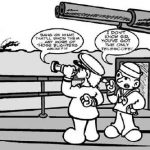Time in a Bottle
Scientists, philosophers, and dreamers have always contemplated variants in other time zones. They have shown us aspects from other points in time; historians and futurists have discussed and discovered elements of our existence past and future over which we can merely ponder.
We know the world was once composed of a single continent and will be again one day as continental shelves continue to shift. Our basic geography is not constant; the map of the world when dinosaurs roamed would bear no resemblance to our maps today.
Politically, too, our maps have changed over time and will continue to do so. Empires have come and gone. Country names and borders of only a century ago have shifted radically.
So, why is it that we generally have difficulty seeing beyond our time?
Time is the one element over which we have no control. We have constructed clocks to measure it. We have broken it up into periods, eras, and calculations in terms of generations beyond “our” time, but reality for us only exists in the here and now. Romantics have written about bottling it like one would a commodity, but physically we can do nothing to stop its march.
 Time is the issue upon which current life hinges; we can analyze it but we have no control over it. We can only choose what to do with the time we do have. Focusing beyond our time looses credibility. Another intangible issue that influences our existence is the fact that we possess morals.
Time is the issue upon which current life hinges; we can analyze it but we have no control over it. We can only choose what to do with the time we do have. Focusing beyond our time looses credibility. Another intangible issue that influences our existence is the fact that we possess morals.
The moral dimension is something that invokes heated debate in all manner of topic.
Some theologians argue for instance against the concept of cloning. Many folk are prone to leaping to the conclusion that it is fundamentally wrong to “play God.” Yet, how many of those same people would instantly change their tune if tomorrow they were faced with the prospect of the losing their own lives or that of a loved one due to a disease or ailment that cloning technology could cure.
It has been said, if God is the great creator, that would include us and our ability to create, to solve problems. He gave us the wherewithal, the brain, the intellect to achieve wondrous things with science. Our constant quest for knowledge is our essence. Looking for answers is what we do as a species; it’s the way we are made. We investigate atoms and send probes to distant worlds.
The same, therefore, can be applied to the science of astronomy and, within that sphere, the capability to seek asteroids. But there is a stigma attached to the subject, a mental block that the astronomers themselves have called the “giggle factor.”
Were we to find an asteroid on course with our planet, wouldn’t we do our very best to prevent the catastrophe? We are creating the technology to act upon the threat of extermination by incoming NEO, and it is commonly believed that we would do something about it if we could.
We do not have to go the same way as the dinosaurs. Science shows us we could do something about NEO’s, and we already possess the ability to find them.
Our technology is not infallible; were we to try to stop a threatening asteroid, even our best technology could go wrong. New things beyond our control always crop up, but we work at fixing them so the same mistakes don’t happen again in future.
The future starts now, and in this case, we have the choice to avoid a “mistake” before it happens. There may not be a second chance.
We possess the ability to choose … and generally we choose life!




